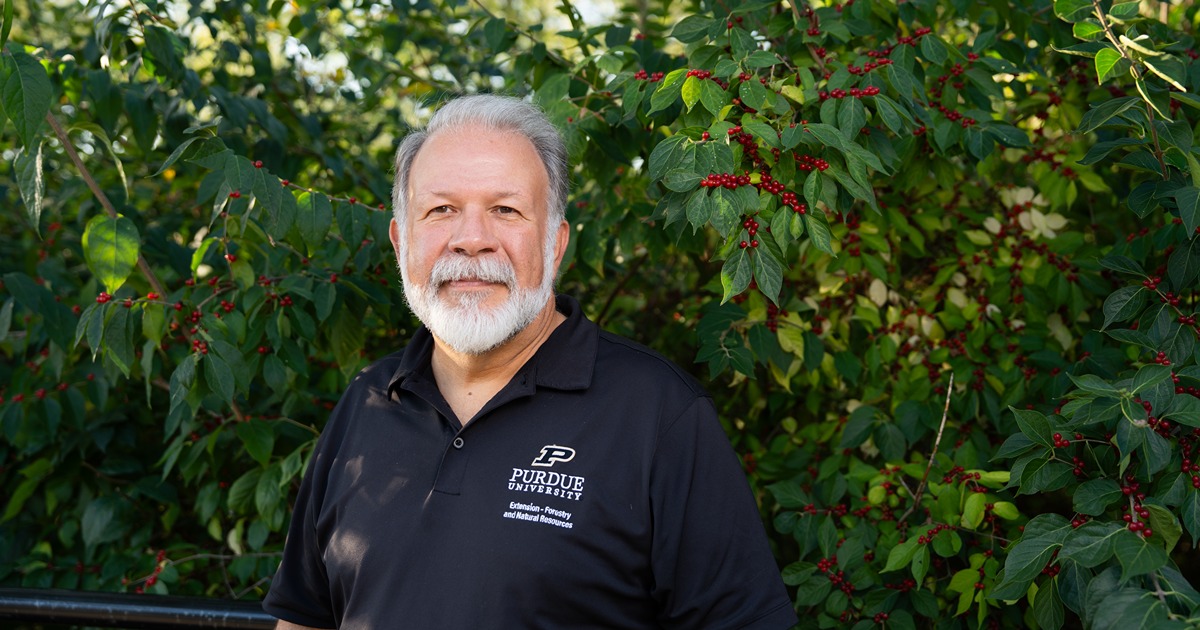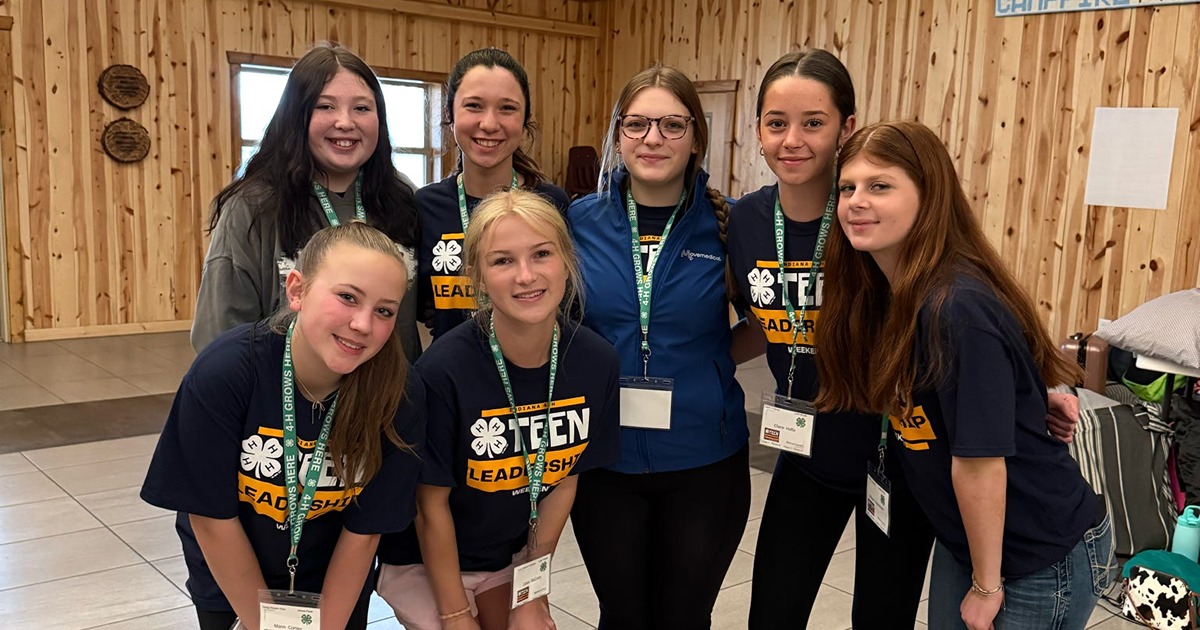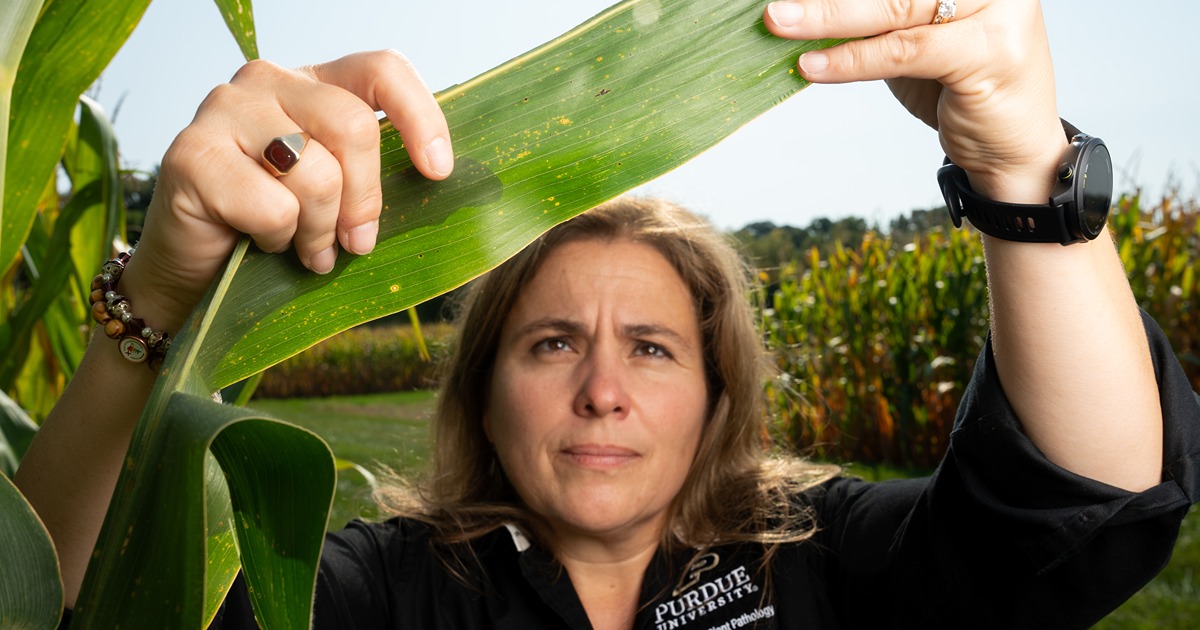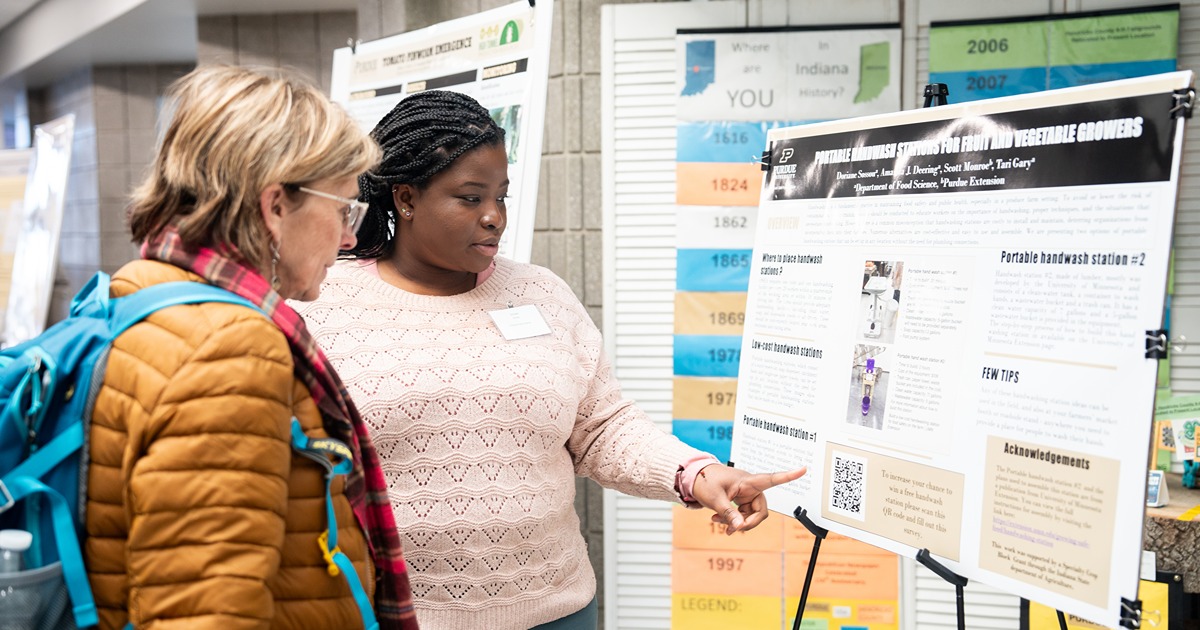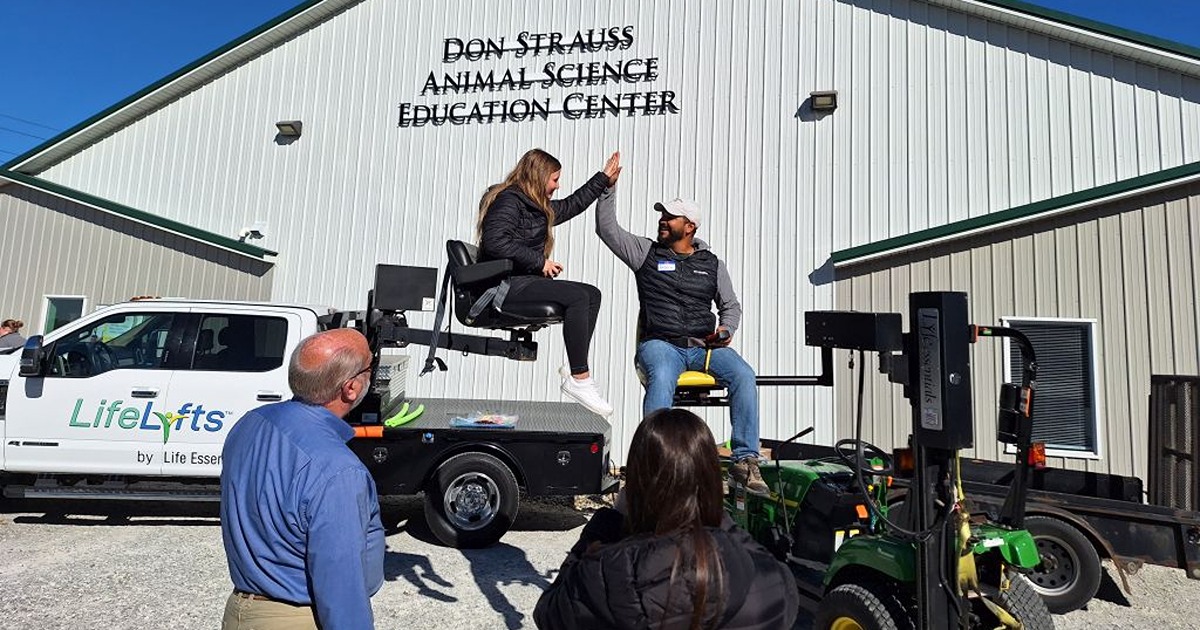Wells County
The Cooperative Extension Service is one of the nation's largest providers of scientific research-based information and education. It's a network of colleges, universities, and the U.S. Department of Agriculture, serving communities and counties across America. The Purdue University Cooperative Extension Service program areas are:
Agriculture and Natural Resources
Health and Human Sciences
Community Development
4-H Youth Development
Purdue Extension is a service tailored to meet the needs of Indiana, needs we know firsthand. Our educators, specialists, and volunteers live and work in all 92 Indiana counties. We provide the link between Land Grant research and Indiana citizens. In doing that we provide practical solutions to local issues. We provide information and expertise that's available in the form you want, when you want it. That's Purdue Extension, Indiana's home team advantage.
What We Do
We improve lives and livelihoods by delivering tested and trusted educational resources. The Cooperative Extension Service is one of the nation's largest providers of scientific research-based information and education. It's a network of colleges, universities, and the U.S. Department of Agriculture, serving communities and counties across America. The Purdue Extension focuses on: Agriculture and Natural Resources, Human and Health Sciences, Economic and Community Development and 4-H Youth.
Contact Us
2025 Wells County 4-H Rule Book
Check out the 2025 Wells County 4-H Rule Book for updated information about your 4-H projects.
2025 Wells County 4-H Rule BookServSafe Classes Offered
For more information and a list of available training's and exams in our area visit the Purdue ServSafe link below.
Learn More HereWells County Newsletters
Check out Health and Human Science Newsletters with helpful articles on health, nutrition, family and finances.
The November/December 2025 edition includes the following articles:
HOW TO HAVE HEALTHIER HOLIDAYS IN 1-2-3!
Stay Active
Even a few minutes of moderate-intensity physical activity can deliver some health benefits and count toward reaching the recommendations. For adults, the many benefits of physical activity include reduced short-term feelings of anxiety and better sleep.
Some tips for staying active during the holidays include:
- When shopping, walk a few laps around the shopping center before going into stores.
- Take the stairs at every opportunity. If you can't climb all the stairs, take the stairs part way, then the elevator.
- Rather than hunting for the closest parking spot, park farther away and walk briskly to your destination.
- When friends and family gather, go for a group walk. You can make the walk more fun by turning it into a scavenger hunt.
- Play an active group game in your yard or local park.
- Bundle up and take a walk instead of a drive to see holiday lights.
Eat Healthy
Eating well supports muscles and bones, boosts immunity, helps the digestive system, and aids in weight management, among other health benefits for children and adults. Good nutrition involves eating a variety of healthy foods. To do that during the holidays:
- If you eat foods that are high in calories, saturated fat, or added sugars, choose small portions and only eat them once in a while. Opt for healthier foods most of the time.
- At parties and other gatherings, fill your plate with your favorite fruits and vegetables first, then add small portions of less healthy items.
- If you are taking food to a party, make it your favorite healthy dish. Then you'll be sure that at least one item at the party will be a healthy choice that you enjoy.
- Make healthier versions of your traditional recipes by using ingredients with less fat and salt.
- Spice up baked fish or chicken by adding salsa or black bean sauce.
- Consider beans in place of higher-fat meats.
- Fill your plate with vegetables and lean protein.
Plan activities that don’t involve eating
Here are some ideas for shifting the focus away from food during the holiday season:
Volunteer in your community.
- Try a seasonal activity such as ice skating or winter hiking.
- Go on a walk and explore a new area with a friend or family member.
- Visit that museum or exhibit you've been wanting to see.
- Consider what new healthy traditions you can start this year. The possibilities are endless!
UPCOMING EVENTS
November 2025
10 Extension Homemakers Executive Committee - 2:00PM
10 Extension Homemakers Presidents Committee - 3:00PM
11 Veterans Days - Office Closed
19 ServSafe Training/Exam in Wells County
27-28 Office Closed - Thanksgiving
10 &17 “Where Does Your Money Go?”
25 & 12.2 “Where Does Your Money Go?”
December 2025
2 Extension Homemakers Holiday Luncheon
24 Christmas Eve - Office Closed
25 Christmas - Office Closed
January 2025
1 News Years Day - Office Closed
12 Extension Homemakers Executive Committee - 2:00PM
12 Extension Homemakers Presidents Committee - 3:00PM
19 MLK Jr. Day - Office Closed
Supporting Your Mental Health During the Holiday Season
By: Tanner Bommersbach, M.D., M.P.H., Policy Fellow, Center for Mental Health Services
In the 2003 holiday movie classic, “Elf,” the main character, Buddy, shares a particular fondness for the holiday season, “The best way to spread Christmas cheer is singing loud for all to hear!” No matter what traditions you celebrate this winter, not everyone shares Buddy’s enthusiasm for this season. While the holidays can be a time of celebration and joy for many, it also can be a period of stress, sadness, and loneliness for oth-ers—and sometimes can be particularly difficult for people living with mental health and sub-stance use conditions.
A survey* conducted by the National Alliance on Mental Illness (NAMI) found that 64 percent of individuals living with a mental illness report-ed that their conditions worsened around the holidays. Whether due to separation from loved ones, personal grief, the pressures of gift-giving, economic hardship, challenging interactions with family members, or shorter days, this time of year can bring unique behavioral health chal-lenges.
As we approach the holiday season, it is im-portant to remember that it is very common to feel added stress — and this stress can worsen symptoms of a mental health condition, such as depression or anxiety, or a substance use dis-order. However, there are ways to help address the stress or condition and improve your mental health. Below are strategies to help you find mo-ments of joy amidst the hustle and bustle this holiday season.
Strategies for supporting your mental health:
1. Pay attention to your feelings Remember that it is okay to feel unhappy during the holidays. Recognizing your feelings is the first step to ad-dressing and nurturing them.
2. Develop a plan for when you are feeling stressed, sad, or lonely This plan may include call-ing a friend or family member, going for a walk, engaging in an activity that brings joy, or watch-ing a favorite movie. Having a plan ahead of time can help ensure the difficult moments are more manageable.
3. Practice self-care It is important to schedule time for yourself and activities that recharge your mind and body. This may include reading a good book, working out, spending time in nature, and practicing stress management skills, such as deep breathing, meditation, and mindfulness. It is also important to remember to prioritize necessities, including eating a balanced diet, getting plenty of sleep, and finding time for exercise.
4. Connect with community If you can’t be near loved ones during the holidays, finding a sup-portive community through clubs, support groups, community centers, local meetups, and faith communities can help reduce feelings of loneliness and isolation. Consider scheduling a regular phone call with family and friends as well.
5. Support others During this time of year feel-ings of grief and loss can amplify. Check in on loved ones who may be alone or struggling dur-ing the holiday season. Helping a friend or neigh-bor not only gives joy to others, but it can im-prove your own happiness and well-being.
5. Support others During this time of year feel-ings of grief and loss can amplify. Check in on loved ones who may be alone or struggling dur-ing the holiday season. Helping a friend or neigh-bor not only gives joy to others, but it can im-prove your own happiness and well-being.
6. Recognize seasonal mood changes Sea-sonal Affective Disorder (SAD) is a condi-tion in which people experience symptoms of depression that are triggered by the change in seasons as the days get shorter. While this form of depression often im-proves in the spring and summer, it is im-portant to talk with your health care provid-er if you feel you are experiencing these symptoms. Treatment is effective and may include light therapy, antidepressant medi-cation, and/or talk therapy.
7. Avoid alcohol and drugs For people in recovery, the holiday season presents challenges that can trigger the use of alcohol and drugs. Having a plan for navigating social events and feelings of loneliness, can reduce the risk of sub-stance use. For family and friends, it is important to check in on those who may be struggling with substance use over the holidays.
Know when to seek help If you feel that your mental health struggles are becoming over-whelming and difficult to handle, it is important to seek help and know that treatment is availa-ble. Below are free and confidential resources that can connect you with effective treatment and support.
You are not alone. Here’s how to seek help.
SAMHSA’s National Helpline — 1-800-662-HELP (4357) - A confidential, free, 24-hour-a-day, 365-day-a-year, information service, in English and Spanish, for individuals and family members fac-ing mental and/or substance use disorders. This service provides referrals to local treatment facili-ties, support groups, and community-based or-ganizations.
988 Suicide & Crisis Lifeline — If you or someone you know needs support now, you can contact the 988 Suicide and Crisis Lifeline. Simply call or text 988 or chat 988lifeline.org.
Veterans Crisis Line — Reach caring, qualified re-sponders with the Department of Veterans Af-fairs. Many of them are Veterans themselves. Dial 988 then press 1.
Source: https://www.samhsa.gov/blog/supporting-your-mental-health-during-holiday-season
Where Does Your Money Go?
How you handle money impacts your financial stability. Join Molly Hoag, Health and Human Sciences Educator, to learn about smart money habits that help you stay in control of your finances.
YOU WILL LEARN SMART MONEY HAB-ITS LIKE:
- Keeping track of what you spend
- Finding where you’re spending too much
- Knowing the difference between what you need and what you want
- Setting clear financial goals in writing
- Making a plan to spend and save wisely
Workshops
1240 4-H Park Rd, Bluffton, IN 46714
Must Attend Both Dates
Must Attend Both Dates Per Class
Class A
Session 1 - November 10 @6:00PM
Session 2 - November 17 @6:00PM
Contact 260-824-6412 by Nov 5 to sign up
Class B
Session 1 - November 25 @6:00PM
Session 2 - December 2 @6:00PM
Contact 260-824-6412 by Nov 19 to sign up
PRESSURE CANNER TESTING
Pressure canner testing is now available again at the Wells County Extension Office.
Drop off your dial gauge pressure canner at the Extension Office M-F, 8AM—4:30 PM. We will call you to pick it up once it’s been tested.
Brands we test: Presto, National, Magic Seal, Maid of Honor
Canners can be dropped off at the Wells County Community Center,
1240 4-H Park Road, Bluffton.
Cost for the inspection is $5.00.
Extension Homemakers Holiday Luncheon
12/2/25
11:00AM
Details to follow.
News Notes for Parents is a newsletter geared towards parents with children ages 8 and under. You will find articles about parenting, early childhood education, nutrition and much more.
In the February 2026 issue of News Notes for Parents, you will find the following articles:
Raise Healthy Eaters in the New Year
Ring in a new year by teaching kids the importance of food, nutrition and eating skills: food to fuel busy, successful lives; nutrition to nourish strong bodies and smart brains; and eating skills to enjoy the social aspect of meals with family and friends.
As a parent, grandparent or adult caregiver, you can help to raise healthy eaters during these critical years by doing your best to:
- Serve regular, balanced meals and snacks with a variety of nutrient-rich foods.
- Provide calm, pleasant mealtimes where adults and children can talk together.
- Remove distractions such as television, phones and tablets so your attention is on each other.
- Allow children to use their internal signals to decide how much and what to eat from the foods you set out for each meal.
- Explore a variety of flavors and foods from different cultures and cuisines.
- Share an appreciation for healthful food, lovingly prepared and shared with others.
- Make food safety, such as washing hands, part of every eating occasion.
- Teach basic skills for making positive food choices away from home.
Find credible food and nutrition resources when you don't know the answer.
While this may seem like an intimidating to-do list, two family habits go a long way to making all this happen: regular family meals and involving kids in nutrition from the ground up.
Make Family Mealtimes a Priority
Sometimes a simple act can have important, long-lasting benefits. According to parenting and health experts, that’s the case with family meals. For example, eating and talking together can help:
- Increase family unity
- Help prevent behavior problems at home and school
- Encourage academic success
- Improve nutrition
Promote healthy weight for kids
With that impressive list of benefits, it's worth making the time and effort to enjoy more meals together each week. Look for easy ways to add just one family meal to the schedule. If evenings seem too hectic for family dinners, set aside time for a weekend breakfast or lunch. After a month or two of this new pattern, try adding another family meal each week. Before you know it, you will be eating together on most days.
Get Kids Involved in Nutrition
Start young and make nutrition fun. There's an opportunity for kids to learn about nutrition in a variety of places — your kitchen, the grocery store or a community garden. Every trip through the supermarket can be a nutrition lesson. Kids can learn to categorize food into groups: grains, fruits, vegetables, dairy and protein foods. They can choose new foods they want to try. For example, let children pick out a new fresh, frozen, canned or dried fruit each trip. As children get older, they can help plan the menu at home and then pick out the foods to match the menu items while shopping.
Nutrition is just one of many reasons to have a garden. The process of planting, watching over and harvesting a garden provides daily opportunities for children to learn valuable lessons and enjoy physical activity, while reaping the fruits (and vegetables) of their labor.
Kids Eat Right content is brought to you by the Academy of Nutrition and Dietetics Foundation, the only charitable organization devoted exclusively to supporting nutrition and dietetics professionals. www.eatright.org
Contributors: Dayle Hayes, MS, RD
Reviewed: December 17, 2025
Source: Kids Eat Right www.eatright.org
Photo Credit: Canva
Needs vs. Wants: The Grocery Store Classroom
Research from the University of Wisconsin–Madison suggests that practicing "choice-making" is a cornerstone of future financial health. You can turn a routine grocery trip into a powerful lesson by teaching your child to distinguish between needs and wants.
The Activity: The "Need" Detective
Give your child a "mission" while shopping. Ask them to help you find three needs (such as milk for strong bones or bread for lunch) and one want (like a favorite box of cookies).
| The "Need" (Essential) | The "Want" (Extra) |
| Water to stay hydrated | Juice because it taste sweet |
| Warm Socks for cold feet | A superhero cape for play |
| Apples for a healthy snack | Candy for a sugary treat |
The Financial Spin: The Power of "No, Not Now"]
When your child asks for an extra toy, use it as a teaching moment for opportunity cost. Explain: "We have $5 left. We can buy the eggs we need for breakfast or the toy you want. If we buy the toy, we won't have eggs tomorrow."
Explaining the reasoning behind spending helps children develop executive function and self-regulation. By labeling items, you aren't just saying "no," you are teaching them to prioritize. This simple shift moves a child from impulsive "I want" to thoughtful "Is this a need?" This habit can help build a lifetime of financial security!
High Protein Cottage Cheese Mac & Cheese
Ingredients:
8 oz elbow macaroni noodles
1 cup full fat cottage cheese
1 cup whole milk
1 cup freshly grated cheddar cheese
1 Tablespoon arrowroot powder or cornstarch
½ teaspoon garlic powder
½ teaspoon onion powder
¼ teaspoon paprika
¼ teaspoon black pepper
Salt to taste
Instructions:
- Cook the pasta according to package directions. Drain and set aside.
- While the pasta is cooking, add the cottage cheese, milk, cheddar cheese, arrowroot powder, garlic powder, paprika and black pepper to a blender. Blend until smooth.
- In a separate large skillet or saucepan pour the cheese sauce into it and heat over medium-low for about 8-10 minutes, whisking occasionally until the cheese sauce is heated and thickens slightly.
- Add the cooked pasta to the cheese sauce and stir to fully coat the pasta. The sauce might seem thin at first but it’ll start to thicken as it sits for a few minutes. Taste and add any additional seasonings if desired. Enjoy!
Storage: Store any leftovers in an airtight container in the fridge for up to 3-4 days.
Nutrition: Serving: 1/4 recipe Calories: 417kcal Carbohydrates: 48g Protein: 22g Fat: 15g Saturated Fat: 9g Cholesterol: 49mg Sodium: 397mg Potassium: 93mg Fiber: 2g Sugar: 7g
Recipe and Photo Credit: High Protein Cottage Cheese Mac and Cheese - Eating Bird Food by Brittany Mullins
Abigail Creigh, Health & Human Sciences Educator www.extension.purdue.edu/Noble
News Notes To Parents is a product of Purdue Extension—Wells County. If you have comments or need information,
call (260) 636-2111 The office is located at 109 N., York St. Albion, IN 46701 Tell someone about us!
Purdue University prohibits discrimination against any member of the University community on the basis of race, religion,
color, sex, age, national origin or ancestry, genetic information, marital status, parental status, sexual orientation, gender
identity and expression, disability, or status as a veteran.
Wells County 4-H Newsletter
September/October
2026 Enrollment
Enrollment for the 2025-2026 program year begins Wednesday,
October 1st! This enrollment period applies to all 4-H participants
including Mini 4-H (grades K-2), traditional 4-H members (grades
3-12), and all adult volunteers. Brief instructions are listed below,
but a detailed version will be sent in the mail and is available
online at www.extension.purdue.edu/wells
ENROLLMENT INSTRUCTIONS:
- Go to https://v2.4honline.com
2. Enter your email and password, then click “Sign In”. Do not
create a new account. If you have forgotten your
username/password please call the Extension Office.
3. Continue to Youth & Mini 4-H Member Enrollment
4. Select the member you wish to enroll and update grade level.
5. Continue on to “Select Club”, then “Select Projects”
6. Once complete, click “Select Questions” and fill out correctly.
7. Pay member dues. Enrollments will not be approved until
payment is complete.
2026 WELLS COUNTY 4-H FAIR
Saturday, July 11th - Thursday July 16th
September
September 1: Labor Day - Extension Office Closed
September 8: Association Meeting, 7:00PM, Meeting Rooms
September 10: Project Round Tables, 6:30PM
September 22: Council Meeting (1st Rule Change Review), 7:00PM, Meeting Rooms
September 16-20: Bluffton Street Fair
September 27: Jr Leader Officer Training
September 28: Horse & Pony Banquet (5:30PM) and Fun Show, 2:00PM, Grandstand
Arena
October
October 1: Enrollment Opens for the 2026 Wells County 4-H Fair
October 13: Columbus Day - Extension Office Closed
October 13: Association Meeting, 7:00PM, Meeting Rooms
October 25: Wells County 4-H Association Spooktacular, 6:00-9:00PM, 4-H Park
November
November 10: Club Leader Meeting, 6:00PM, Meeting Rooms
November 10: Council Second Rule Change Meeting and Elections, 7:00PM, Meeting
Rooms
November 17: Association Meeting, 7:00PM, Meeting Rooms *Elections*
Adult Volunteer
Enrollment
Adult volunteers must re-enroll in 4-H Online to be a volunteer for the 2025-2026 year. This means completing all of the volunteer training. It does have to be done each year. Any new volunteers will also need to complete the enrollment process.
To enroll, log in to your 4-H Online account. Enrollment begins October 1st
Returning members will choose “Adult Enrollment”, and new members should click “Adding New Members”. You will then follow the instructions until enrollment is complete, making sure to watch all the video trainings.
4-H Benefit Auction
January 23, 2026
As a big look ahead, we want to keep in everyone's mind the 2026 Wells County 4-H Benefit Auction.
Come be part of a night full of community spirit, delicious food, and an exciting auction. It’s a wonderful way to support youth development and the continued growth of the Wells County 4-H Park.
Meal 5:00PM-7:00PM
Silent Auction 5:00PM-6:30PM
Special Features start at 6:00PM
Live Auction starts at 7:00PM
Pick Up Projects:
The Extension Office is currently housing
SEVERAL county and state fair projects that need to be reunited with their rightful owner. Although we have enjoyed their company, it is time for them to make their way back to their forever home. If you are missing a project from either the county or state fair, more than likely we have it! Please come pick it up ASAP from the office.
Our office hours are Monday - Friday from 8:00AM-4:30PM. If you are unable to come during those hours please call 260-824-6412 to make other arrangements. Your projects miss you and want to come home!
Cash Your Checks!
This is a reminder to all 4-H Auction Participants that your checks from the auction should be cashed by November 30th or funds will be forfeited. If you have yet to pick up your check, please do so ASAP!
Make sure to bring in your thank you cards addressed, stamped & sealed. Checks will not be handed out until thank you cards have been turned in.
Wells County 4-H Association Spooktacular
October 25, 2025
from 6:00-9:00PM
Wells County 4-H Park
Volunteers Needed: Please look out for
sign-up sheet to come
More information To come : info will be posted on Facebook and flyer will be sent out
Spooktacular Volunteers:
The Wells County 4-H Association is hosting their Spooktacular festival again this year! Check out page 6 for date and details. They are looking for adult and youth volunteers to help with the carnival games, concessions, and the spooky forest. If you are interested in helping out please contact Brandon at 765-499-7042 or Janet at 260-273-1123.
Pancake Booth Sign Up:
4-H Pancake Booth will once again be at the Bluffton Street Fair this year! The Booth is a great fundraiser for 4-H, as these funds help sponsor our ribbons at the Fair and various 4-H Trips that our youth get to attend.
Volunteers are needed for various shifts throughout the week. Each township is responsible for finding 12-16 people to work during their assigned shift.
Volunteers will be cooking food, taking orders, and help deliver food to guests. It really does take several people to run the booth smoothly. Shift days are listed below. Sign up online at:
https://bit.ly/PancakeBooth2024
TUESDAY, SEPT. 16TH 5PM TO CLOSE
Liberty Township
WEDNESDAY, SEPT. 17TH 7AM - 5PM
Community Volunteers
WEDNESDAY, SEPT. 17TH 4:30PM TO CLOSE
Chester Township
THURSDAY, SEPT. 18TH 7AM - 5PM
Community Volunteers
THURSDAY, SEPT. 18TH 4:30PM TO CLOSE
Jefferson Township
FRIDAY, SEPT. 19TH 7AM - 5PM
Jackson Township & Shooting Sports
FRIDAY, SEPT. 19TH 4:30 TO CLOSE
Nottingham Township
SATURDAY, SEPT. 20TH 7AM - 12PM
Rockcreek Township
SATURDAY, SEPT. 20TH 11:30AM - 5PM
Lancaster Township
SATURDAY, SEPT. 20TH 4:30PM TO CLOSE
Harrison Township




